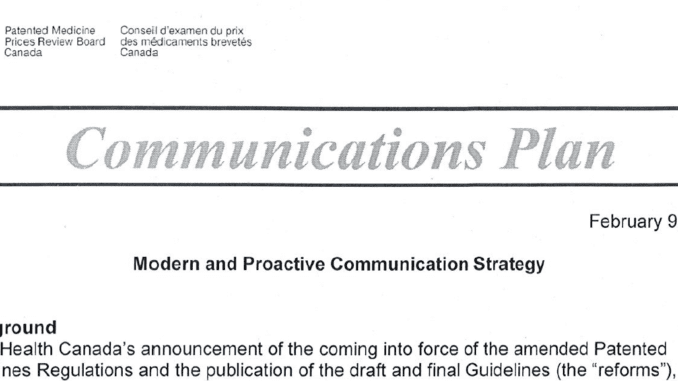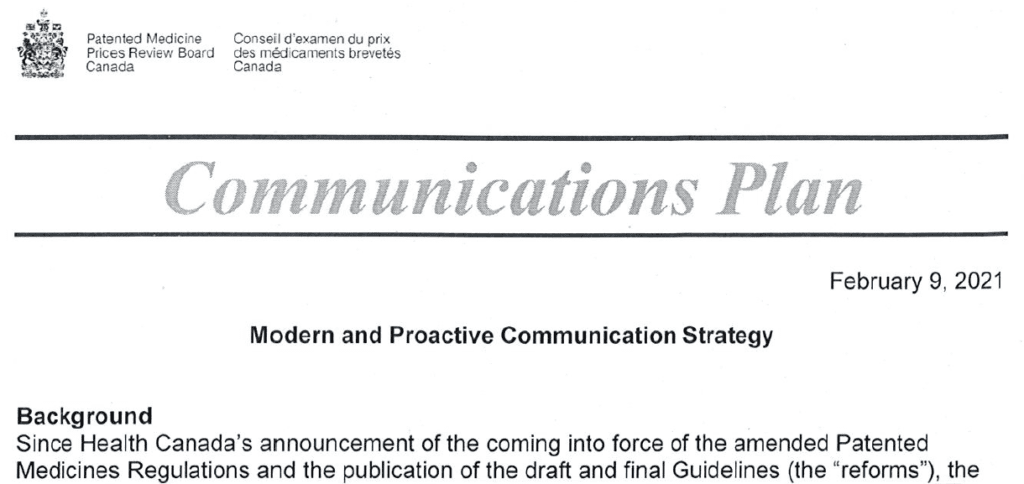

TORONTO, May 26, 2021 – The Canadian Organization for Rare Disorders (CORD) is dismayed but not surprised to have confirmation that the federal government’s Patented Medicine Prices Review Board (PMPRB) never truly intended to consult on changes to drug pricing regulations.
For the past five years, patients and other stakeholders have been denied requests for genuine dialogue with the PMPRB on their massive overhaul of drug pricing regulations that will position Canada at the very lowest end of comparable developed countries. Instead, a communications plan just made public by a Member of Parliament through Access to Information (bit.ly/3vgqmkY) shows that the PMPRB is doubling down on dismissal of genuine patient concerns and discrediting patient groups as “fear-mongering.”
“Reading the denigrating comments and aggressive strategy revealed in this plan validates the feelings I had throughout my experience in 2018 on a key PMPRB Steering Committee,” said Durhane Wong-Rieger, President and CEO of CORD. “We had absolutely nothing to steer, we were given none of the data and analyses that supported the proposed regulations, and we were told that it was NOT part of our mandate to consider alternative approaches.”
The PMPRB’s Executive Director, Doug Clark, was quoted back in November 2018 by the CBC as saying that “patient groups are aligned with industry on most issues” and “[t]here’s not a lot of daylight between their two positions.” As we noted then in an open letter to Mr.Clark and to the Chair of the PMPRB, these statements not only malign CORD and the other organizations on that committee, but all patient groups and advocates who work tirelessly in so many ways to represent, support, educate, care for and raise funds for the patients and families that we serve.
Nothing has changed nearly three years later, with the recent release of the PMPRB’s February 9, 2021, “Communications Plan,” which is in fact a wide-ranging advocacy campaign that aims to amplify external stakeholders, target and support MPs and stakeholders who are aligned with the PMPRB’s positions, while actively discrediting anyone who questions or critiques them.
“I am so saddened that a regulator in Canada would request and budget public money to conduct a lobbying and advocacy campaign rather than engaging in constructive dialogue,” said Wong-Rieger. She noted that CORD has held dozens of meetings, webinars and panels on the issue, with regular and open invitations to the PMPRB to participate and they never came. Global experts on pricing policy from the UK and the United States have taken part, and industry representatives have walked through how the PMPRB reforms raise flags around researching and marketing new drugs in Canada.
According to Wong-Rieger, “Nobody wants sustainable affordable drugs more than patients but the majority of experts have raised serious concerns that the PMPRB regulatory practices will lead to unsustainably low and unpredictable prices in Canada. This is not a threat, it’s just the reality of a market that’s less than 2% of the global share.”
CORD has provided submissions to the PMPRB’s guidelines processes that show how far back Canada is when it comes to new medicine approvals and other evidence of how and why the PMPRB is holding Canada back.
Wong-Rieger remembers begging the PMPRB to share and work through case studies to explain how the price regulations would work. When a handful were eventually brought forward by PMPRB staff, there was no time to discuss them, and the staff wouldn’t even share the calculations they used to develop them.
According to the communications plan, the PMPRB is undeterred in rolling out their new pricing plans on July 1, despite the lack of answers to the concerns raised.
For rare disease patients, this comes at the worst possible time as the federal government is rolling out Canada’s first Rare Disease Drug Strategy. “We simply cannot understand how a government that is committed to making the best therapies available would also allow the PMPRB to enforce and spin regulatory changes that will undoubtedly deter or delay these new drugs coming into Canada,” said Wong-Rieger.
“Other countries have figured out how to manage pricing and access through cooperative policy development, not through punitive regulations.”
“We are calling upon the federal government to put an immediate halt to the PMPRB plans to implement changes on July 1 until there are genuine consultations and alternative pathways considered. Patients’ lives and well-being are at stake, and it is clear that the PMPRB cannot be trusted with such an important mandate.”
About Canadian Organization for Rare Disorders (CORD)
CORD is Canada’s national network for organizations representing all those with rare disorders. CORD provides a strong common voice to advocate for health policy and a healthcare system that works for those with rare disorders. CORD works with governments, researchers, clinicians and industry to promote research, diagnosis, treatment and services for all rare disorders in Canada. For more information, visit www.raredisorders.ca
For further information:
Durhane Wong-Rieger, Canadian Organization for Rare Disorders
(647) 801-5176, durhane@gmail.com
For interviews and media enquiries:
Don Sancton, Senior Associate, 3Sixty Public Affairs
(514) 206-1191, dsancton@3sixtypublicaffairs.com

